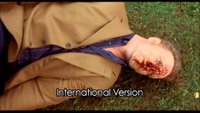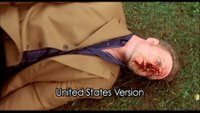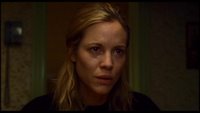"You're still pretty good with the killing. That's exciting."
The first time I watched A History Of Violence I think I got it for the most part. On the surface it was an entertaining revenge flick with some serious spurts of graphic violence and sex. But what it was really was - was an essay on the violence in the body of work of director David Cronenberg and contextualising it in "the history of violence" in general, in all its forms. This became even clearer on the second viewing and even more on the third viewing (with Cronenberg's commentary switched on).
Cronenberg has "a history of violence" which dates back thirty odd years. However, it has been of the legal kind on the big screen. From the exploding head in Scanners to the human biomechanical weaponry of Videodrome and eXistenZ, Cronenberg has been the pioneer in "body horror", a type of horror film that it most personal to us all - our own bodies.
Cronenberg had started to move away from the literal graphicness(?) of his earlier work into (slightly) classier, less gruesome, but just as disturbing fare such as Dead Ringers, Crash and Spider in recent years. A History Of Violence on one level, is a return to the more intimate 'body horror' films of the past, but on another level, it's something else all together - a kind of hybrid film that Cronenberg hasn't attempted before, he's straddling the mainstream while retaining his independence. Only New Line could have allowed him to get away with it (in much the same way they support "indie" filmmakers such as P.T. Anderson). It's his best film since Dead Ringers (1988) and his most entertaining since The Fly (1986). He's displaying a marked maturity in his work without losing his edge as an artistic filmmaker. That's rare.
Or maybe not. Some of Cronenberg's very early films (such as Crimes Of The Future) were very cold, THX 1138-like science fiction. In between Rabid and The Brood he made Fast Company, a racing car movie (he's a racing nut). And more recently he took on an adaption of David Henry Hwang's play M. Butterfly. Plus he's been linked with making movies as varied as Star Wars Episode VI: Return Of The Jedi, Total Recall and Basic Instinct 2.
I may be drawing a long bow, but I think a line can be drawn between Cronenberg and David Lynch. Lynch also makes highly individual films (Eraserhead, Blue Velvet, Wild At Heart), and like Cronenberg, they nearly all stem from his own imagination. And like Cronenberg, he has occassionally stumped his fans and critics alike by taking on projects that on the surface seem to bear no relevance within the context of his career (The Elephant Man, Dune, The Straight Story). Yet I believe that in both cases, these supposed "outside" films are in fact, integral to their personalities and careers, providing material that is totally in keeping with their personal barometers while potentially expanding their range for the purposes of gaining the respect of their peers and studios alike.
In fact, in keeping with the Lynch idea, there are parts of this film which seem oddly Lynchian (although in his commentary, Cronenberg mostly disses this, identifying Lynch's work as ironic, whereas this is not). The opening scenes seem eerily like they're from a Lynch film. We open with the outside of a motel, as a boring conversation between two men takes place, full of long Lynch like pauses and short responses and then a very funny tracking shot as the car pulls up outside the motel office (again as Cronenberg points out it's all in one 4min shot). The film takes place in small town apple pie America (like Blue Velvet or Twin Peaks) so it's kinda like Lynch without the surrealism. Or more blatantly, the idealised version of what Americans think the US is like (but really isn't). Cronenberg has flirted with these ideas before, particularly in The Dead Zone, but this is his most pointed effort into the heartland of America.
SPOILERS START:
.
.
.
A History Of Violence might be considered on the surface one of these "outside" Cronenberg films. It is made by a major studio, has A list actors (Viggo Mortensen, Mario Bello) and doesn't (really) contain any graphic violence that you wouldn't find in your typical Lethal Weapon-type flick. The film is about violence, in all its forms. The most obvious form is the physical violence that Tom inflicts on people in the film.

Indeed there are two moments which are ever so slightly modified from their on the R1 DVD. When Ed Harris' henchman gets his nose broken and when William Hurt's henchman gets his neck crushed, the amount of blood was reduced (and some sound effects were altered on the neck crush slightly also). The differences are so negligable, that Cronenberg agreed there was no point in doing an Unrated Edition. So, the R1 DVD includes in its supplements, Violence's History (2m), which includes the original versions of these two shots (this is possible because in the US, unlike Australa and the UK, the supplemental material on a DVD does not go through the standard rating process and the the extras are left Undated. Go figure). I assume the local release will be uncut like the cinema release. The violence Tom inflicts is brutal, but brief. No sooner have you flinched, than it is over. As Cronenberg has stated, the audience is made complicit in the violence - you are rooting for Tom, even as he is snapping the henchman's neck. Cronenberg is implicating his audiences in these heinous crimes.

As Tom reassures his daughter in an early scene: "There are no monsters". But as we see in the film, there are monsters. It just becomes a little hazy as to who the monster is. Is it Harris, maybe it's Hurt. Or is it Tom himself, who kills at least three people in the film and injures several more. In fact, there is really no overt violence inflicted by the supposed bad guys. They are threatening, sure, but it is Tom and his son that commit all of the major crimes. And why does Tom do it? On the surface it appears that he's doing it to save innocent lives (especially the cafe scene). But if he knows these people, isn't he doing it to save his own bacon? Just after he kills Leland and Billy he looks at the gun as if to save: "Oops. Now I'm in deep shit".
In fact (and as Cronenberg points out) the are enough moments of expression by Mortensen that on a second viewing of the film, it is apparent very early on that Tom and Joey are one and the same. These moments are brief, but make you appreciate Mortensen's talent even more.
Once Tom has killed the two in the cafe he is hailed a hero. In only a couple of quick brushstrokes, Cronenberg succinctly defines Tom's new relationship with the townsfolk and the media. The media has reduced the news to the most base of elements, otherwise is purportedly "not good news". It portrays violence as a good thing if committed by good people, and puts Tom on a pedestal, somewhere even he doesn't appear to want to be.
The community are in on it as well. A reasonably small, close-knit community they rally for Tom: outside the hospital, in the cafe, after the shooting. As the sheriff puts it: "We look out for our own". Yet do they really know Tom? The early scenes make no mention of his past. And when Ed Harris comes in to town, accusing Tom of being someone else, everyone from his wife to the sheriff blindingly accept Tom's denials without question.
The film has two sex scenes that couldn't be more different. The first is a kinky, consensual scene in which Edie Stall comes on to Tom in a cheerleader's uniform and ends with them pleasuring each other (can't remember another mainstream film doing this?) (Cronenberg states on the commentary that this was the first time 69 had been performed in a mainstream US film). The second sex scene is much more questionable as Tom grabs Edie in the staircase, choking her and forces her down. This also very much plays into the themes of the film, as we seem to see the Joey character come to the fore and the question of whether or not Edie actually enjoys this side of Tom. Nicely contrasting the earlier scene, this is much more disturbing to witness (although, again, on the commentary Cronenberg flatly denies this is a rape scene of any kind).
As I mentioned before, it is just Tom and his son that commit the overt violence. Sure there is some justification to it, but a shot gun blast in the back? What a horrible way to go. Some people have criticised the whole Jack Stall school bully subplot. And yes it is kinda cliched, as he is taunted and then gets his own back. But it is totally in keeping with the greater themes of the film. It makes total sense that Tom, a former killer who's tendencies have resurfaced, has born a son who "wants to follow in his footsteps", standing up for himself a little too much with the school bully. Tom's response to this is to slap his own son down which makes it all the more ironic when his son kills Forgarty to protect him.
The exposition of how and why Joey became Tom are incidental to the overall arc of the film and Cronenberg and screenwriter Josh Olson wisely downplay it. There are more important thematic elements at stake as the film builds to its sombre climax. The film is only 100 minutes long and Cronenberg seems to me to be one of the few modern filmmakers who understands efficient storytelling.

The final scene has Tom returning home to the family after having slain his brother and crew. He comes into the kitchen where the family are sitting. The daughter gets a plate for her father. He sits down. His son hands him some food. He stares at his wife who stares back at him. The end. This scene has no dialogue. So many thoughts raced through my head at this. Tom is asking for forgiveness of his family. He has washed (literally) the last remnants of Joey from his body. His children have taken steps towards forgiving him (assuming they know the truth). This family will never be the same after this series of events. It will take a long time to rebuild. Some people hated this ending as nothing was resolved. The ending does provide mixed emotions and it is hard to gauge how things will turn out for the characters. I guess that's what any good film does.

It probably goes without saying but every element of the film is expertly handled. The cast are uniformly excellent: Mortensen, Bello and Ashton Holmes are excellent as the Stall family, Heidi Hayes is ok as the daughter, but doesn't really have to do anything. Harris is very good as Fogarty, but it was Hurt who blew me away in his single scene as Richie Cusack. With his goatee and strange Dr. Zoidberg like accent, it is unlike anything he has done lately. It is a single scene showy role (which Cronenberg defends as integral to the film) - but it should never have been nominated for an Oscar. Special mention must also be made of Stephen McHattie and Greg Bryk as the Lynchian-like flunkies who Tom kills early in the film.
Technically the film is a peach, I guess partly because all of the main tech crew have all worked with Cronenberg many times over the past twenty odd years. Editor Ron Sanders and production designer Carol Spier both worked on Fast Company and (I think) all of Cronenberg's films since, DP Peter Suschitzky shot all of his flicks from Dead Ringers on), Denise Cronenberg (sister), is the costume designer and first worked on The Fly, composer Howard Shore first worked on The Brood and makeup artist Stephan DuPuis has worked on most flicks since Scanners onwards and won (I think) the only Oscar for a Cronenberg film, for The Fly.
The documentary, Acts Of Violence (66m) is exceptional. It's extremely rare for an electronic press kit to be so insightful into it's parent and still provide all of the necessary behind the scenes sweetness. An impressive number of interviewees have been assembled: Cronenberg, actors Mortensen, Bello, Harris, Holmes and McHattie, producer Chris Bender, writer Josh Olson and all of the crew members I mentioned above. Some of the behind scenes are nice and appropriate: SFX man Gary Kleinsteuber shows how to make a squib and at one point Cronenberg gets into bed with Viggo and Maria.
There is one deleted scene, Scene 44 (3m) which is, surprise, surprise, a dream sequence where Tom shots Fogarty to the cafe floor and he looks up with his gun and a huge smoking hole in his chest. This piece is pure Cronenberg and as he himself puts it in the featurette, would not have looked out of place in Videodrome. However, it is totally appropriate to have removed it from the film. It would have opened up a whole other can of worms that they couldn't have addressed properly in the existing film. This includes a running commentary by Cronenberg.

Unmasking of Scene 44 (7m) is a brief making of for the above dream sequence. Once again all of the appropriate people are interviewed, and Cronenberg quips at one point: "I've already done the gun from the chest gag".
The brief featurette, Too Commercial For Cannes (9m) shows Cronenberg on the other side of the judges panel as he arrives with the key people to the Cannes screening and are later seen attending the press conference.
Finally, and as mentioned already there is Cronenberg's commentary. A seasoned commentator (I think his first was for Criterion's laserdisc of Dead Ringers) he is always an insightful and thoughtful speaker. His anecdotes are many: the hotel was used previously in eXistenZ, the bar in The Fly, how Mortensen liked to decorate the sets with found items, how he obtained dvd's from the net on how to kill people on the street for the violent scenes and the real bruises Mario Bello obtained during the staircase sex scene. He also points out many things I probably only subconciously had realised: the cook's dream about stabbing his wife to be, the color of shirts of the softball team, the Ford/Hawks western motifs throughout, the numerous times that Mortensen would briefly drop into "Joey" mode, plus one that he hints at but never states out loud: that this film shares a kinship with Scanners - both are films about brothers. It's a shame all commentaries aren't this good, but then again, films are never this good.

0 Comments:
Post a Comment
<< Home